by Rebecca Tombaugh
Afraid of walking alone? Never fear — a new bot has come to the rescue.
“We Walk Together,” a bot through Facebook Messenger, allows solo walkers to summon a “buddy” instantly.
“It’s ‘Uber’ for walkers,” says Rachel Fustini, of Overland Park, Kan., co-founder and advocacy director.
Her roots stretch across the metro. Her grandpa grew up in Wyandotte County in an orphanage. He had four brothers and a sister. He worked his whole life at General Motors, and he and his sister are buried in Maple Hill. He died when she was 16.
Fustini, of mixed heritage, has personal reasons to be concerned. Her father, Hispanic.
Fustini says WWT works in the metro, as well as around the world. Right now, it is in English, but they hope to add more languages soon.
“Es para los que necesitan otros,” says Fustini, translated, “It’s about anybody who needs somebody.”

Fustini says the idea started after the November election. She got on a group page on Facebook where everyone was talking about wanting to do something to help — anything — and positive.
“This is my anything,” says Fustini.
She and two others chatting on the group page were seeing reports of a rise in hate crimes around the country.
“People are more brazen,” she said.
Fustini pointed to the threat of danger to showing up right here in the metro area in February when an Olathe man was charged with murder after shooting two Indians and a white intervenor. One died and two were hospitalized, according to the Associated Press.
“I wish someone would have done something,” she says, “like call 9-1-1.”
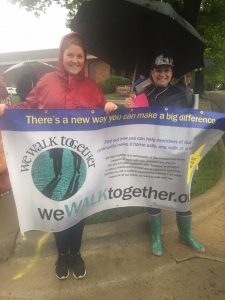
She saw other people were concerned, too. Fustini felt the concern had to go beyond complaining. Yet, a big movement can be overwhelming when an individual wants to do something. The bot made sense because it gives anybody a way to be part of the community down to their own neighbors on the same block.
“We’re all in this together,” she says.
Fustini has always been involved with advocacy. She does clothing drives and fundraisers. Her undergraduate degrees are in Spanish and Intercultural Communications. Her dissertation at the University of Missouri-Kansas City was on Deferred Action for Childhood Arrivals (DACA) students. She was a Bernie Sanders campaign volunteer. The title of her day job is “rare disease advocate.”
“I love it,” she says.
She even has a rescue dog, a mutt she named “Sabina.”
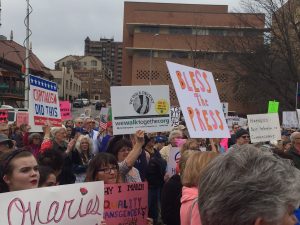
But, she says, after the election, her focus changed.
“People are being attacked now,” said Fustini, and goes on to explain.
WWT is for, say, a woman wearing a hijab. The woman may not feel safe. She can use the app to not be alone in a situation, as in there is safety in numbers.
“It stops the harassment or de-escalates it,” she says. “This is America. No woman should be afraid of walking out in her neighborhood.”
Fustini says she would like the bot to become a way for people to connect in their own communities.
“People have biases, we want people to break (away from) their biases,” says Fustini.
Fustini, herself, recalls one protest where she was faced with a man from the other side. She talked with him, and got to know him.
“We can build trust with each other,” she says.
The bot is not just for those feeling prejudices, says Fustini, but for anybody who thinks to themselves, “I want to help my neighbors.” The bot lets them see who indeed needs help, such as an older person walking to the grocery store. That older person may be four houses down, but the buddy would never have known.
“It can be just getting to know your neighbors,” she says.
Fustini demonstrated on her phone how the app works. She pulled up the Facebook page “We Walk Together.”
Then, a walker sends a chat message.
Two buttons appear:
Do you want to be a walker?
Do you want to be a buddy?
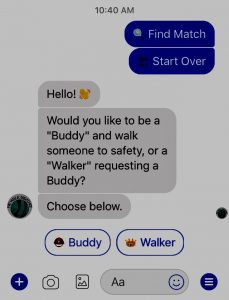
The walker clicks on which one to be, and is then prompted to send a location.
Fustini says a person could be a buddy one day, and a walker another day, saying, “Today — I need help.”
The involvement is up to the person.
Afterwards, the bot allows the buddy and walker to rate their experiences.
No training is provided. They have added disclaimers. Fustini says no data is shared.
“WWT is a private organization whose international team has poured both their time and savings into the project,” says Fustini. “We are not in the business of anything, we are in the effort to build stronger communities, and that means keeping user data private.”
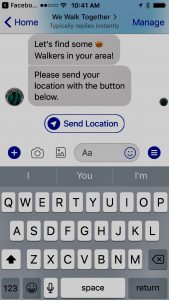
Fustini says for those who may not know what to do in certain situations, the bot has a chat feature. That also allows for specific info to be communicated quickly, such as “I’m wearing a yellow shirt.”
While the bot started as a response to hate crimes, Fustini says it has already grown into a way for neighbors to connect in a neighborly way.
“I see people connecting with a generation today that they probably wouldn’t have,” she says.
Fustini also explained how the bot came to be. She happened to be in a group on Facebook talking about post-election racial problems, and just clicked with two other women. She talked to them every day.
“We just clicked,” she says. “We’ve yet to meet in person.”
Soon, they came up with the idea.
Fustini told them, “Let’s do it.”
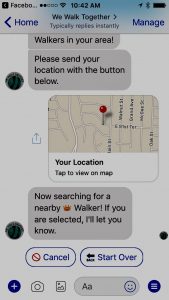
Fustini says WWT is a bot powered through Facebook Messenger. To have developed it would have cost $70,000.
“We’re just normal people,” she says.
The other two people are Do Young Ji, and his fiancé Ava, who live in New Jersey. Ji says the Brexit election was the genesis of what he felt was a “racial backlash,” against ethnic groups, including Asians and Indians.
“That doesn’t seem right,” he said.
Ji wanted to do something.
“I’m from a close-knit family in a very small town,” says Ji. “Not being there to help your neighbors just seems unthinkable to me. I think we all want to do something, and WWT is a way to be there and help build stronger communities, wherever we are.”
Ji, a banker and self-described “geek,” said he had made bots and apps before.
“But nothing of this capacity,” he says.
So, Ji took a hiatus from his banking career and they used their own money and savings to pay for developers. That took time and researching, and after more months of testing, they rolled it out on a trial basis.
“I liked what I was seeing,” he recalls.
Ji is a citizen and has lived in America for decades. But his fiancé, who was born in Casablanca and moved from London to the United States a few years ago, wanted to return to London because she was afraid.
“Let’s see what happens, he told her, “if things get better.”
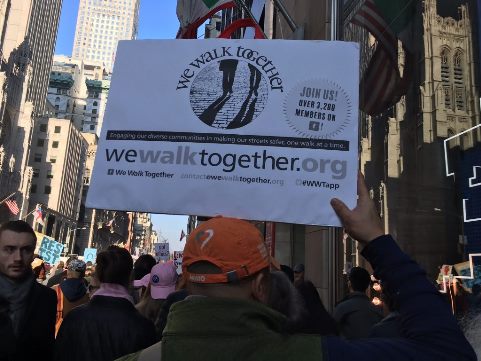
In March, she gave a demo at Northeast High School in Kansas City, Mo. She is looking for partnerships and colleges. Fustini is also applying for grants.
“It doesn’t matter if you voted one way or another,” she explains, “if you want to help someone in your neighborhood, in school or the subway, or your community, I’m going to give the person the way to do that — and I’m going to be proud of you for doing that.”
For more information go to:
@wwtapp
wewalktogether.org
Story copyright 2017 by Rebecca Tombaugh
